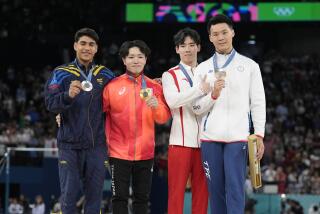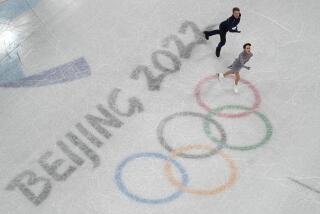Oh, Say Can’t You See Why We’re Losing Out on Medals?
- Share via
MOSCOW — When Russian gold medal winners mount the Olympic podium this week and beam as their national anthem blares, they’ll be at a loss for words.
Even if they want to sing along, they can’t. The song has no lyrics.
Nine years after the collapse of the Soviet Union, Russia is still officially anthem-less. It is also flag-less and emblem-less. The world’s largest country is getting by with only temporary symbols of nationhood.
There is a song, to be sure, which is being played for Olympic winners--a hard-to-hum tune called “Patriotic Song,” written in the 19th century by composer Mikhail Glinka. But in addition to being only a provisional anthem, it’s nearly tuneless and still completely wordless.
“How can it be that the anthem has languished without words for 10 years?” wrote the daily Komsomolskaya Pravda. “Surely we don’t need to explain to anyone how important it is to be able to hear ‘Patriotic Song’ sung by a proper choir?”
In recent months, a new push to solve the problem has come from an unlikely place: Russia’s sports community. Athletes say they are tired of the fact that when they win, they have nothing to sing.
“To see another country’s athletes sing their anthem when you know that you can’t even say a word of your own totally kills the fighting spirit of your team,” said Valentin I. Pokrovsky, 68, deputy manager for Moscow’s popular Spartak soccer team.
In fact, his team recently sent a letter to President Vladimir V. Putin pleading with him to finally come up with some words for the song. The team members hinted that a recent losing streak was somehow mystically connected to the fact that they had nothing to sing if they won.
“We don’t want to hang our heads any longer when our country’s anthem is played in domestic and international arenas,” the players wrote. “This is the best way to lose a match before it even starts.”
Russia’s stopgap symbols--the red, white and blue flag, the double-headed eagle emblem and the wordless Glinka anthem--were adopted by decree by former President Boris N. Yeltsin as he presided over the collapse of the Soviet Union. The symbols were essentially the same ones used in Russia before the Bolshevik Revolution, just stripped of monarchical trimmings such as the crowns on the eagles’ heads.
While in wide use, the anthem, flag and emblem have never been ratified by parliament. And in the interim, some Communist Party deputies insist on wearing name tags adorned with the old hammer and sickle.
Georgy V. Vilinbakhov, Russia’s master of state heraldry, complains that it’s only people who want to go back in time who make an issue of the anthem.
“The issue of the ‘wordless’ national anthem is stirred only by those who are dissatisfied with the existing official symbols of state power, including the anthem,” he said. “These people would like to return to the trappings of the past.”
But it’s not that simple. The struggle over Russia’s symbols is also a struggle over Russia’s identity. And because they can’t agree on where their country is headed, Russians don’t agree on what anthem they should sing on the way.
In fact, a recent poll by the Public Opinion Foundation found the public as divided as possible--21% said they’d prefer to stick with the words and music of the Soviet anthem, 18% would like to keep the old music but find new words, 15% want Glinka with words, and 15% want to start from scratch.
For whatever reason, the issue doesn’t go away. These days, Communists and frustrated singers are pushing to bring back the Soviet anthem, which nearly everyone can still sing. Putin himself is rumored to favor the old melody.
Meanwhile, at their proudest moment, Russia’s Olympic athletes will find themselves speechless. And, according to Pokrovsky, maybe medal-less as well.
“I’m convinced that one of the reasons why we are losing medals to the United States in Sydney is because the Russian team does not have a national anthem,” he huffed.
*
Alexei V. Kuznetsov of The Times’ Moscow Bureau contributed to this report.
*
For more Olympic coverage, see Section U.
More to Read
Go beyond the scoreboard
Get the latest on L.A.'s teams in the daily Sports Report newsletter.
You may occasionally receive promotional content from the Los Angeles Times.






